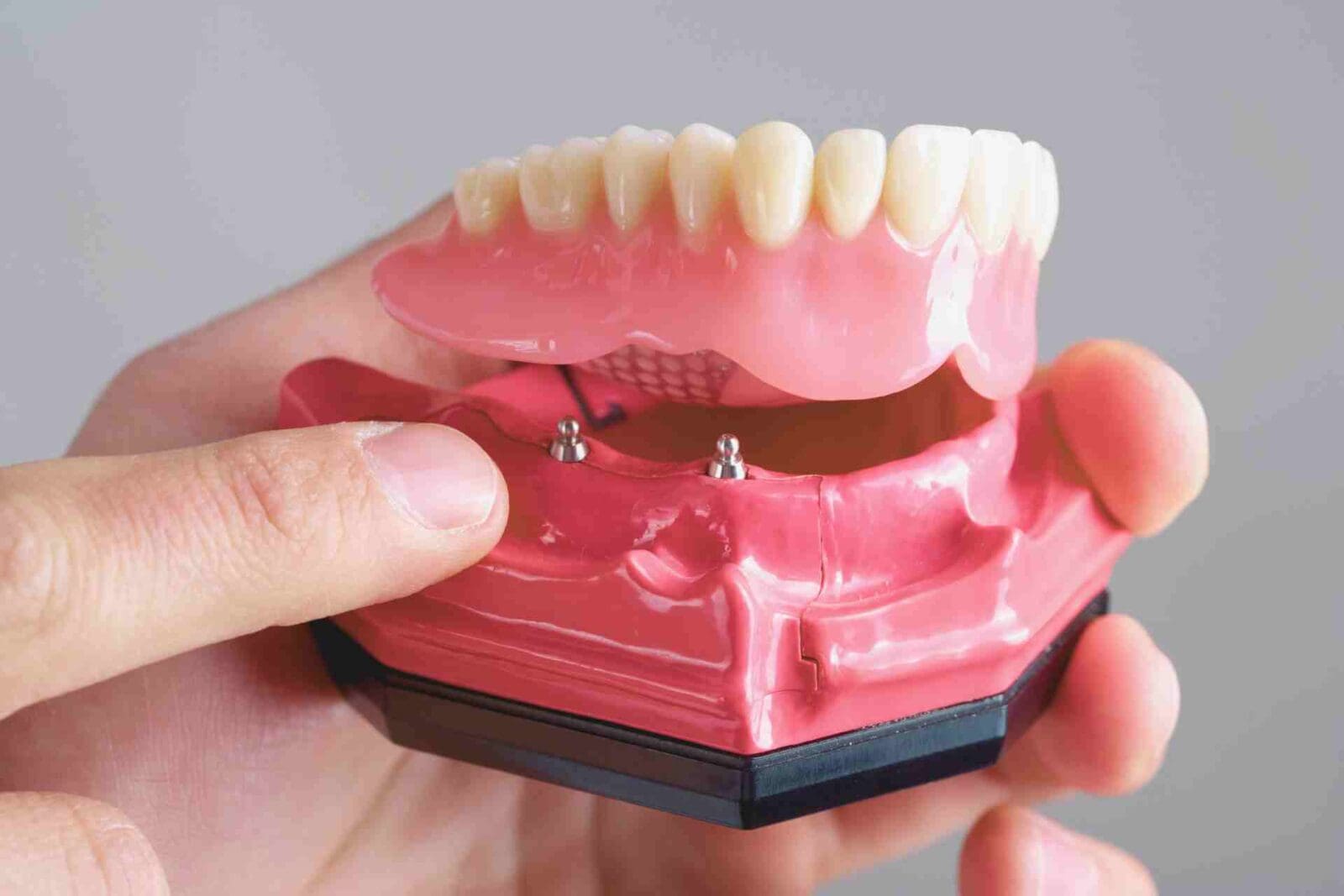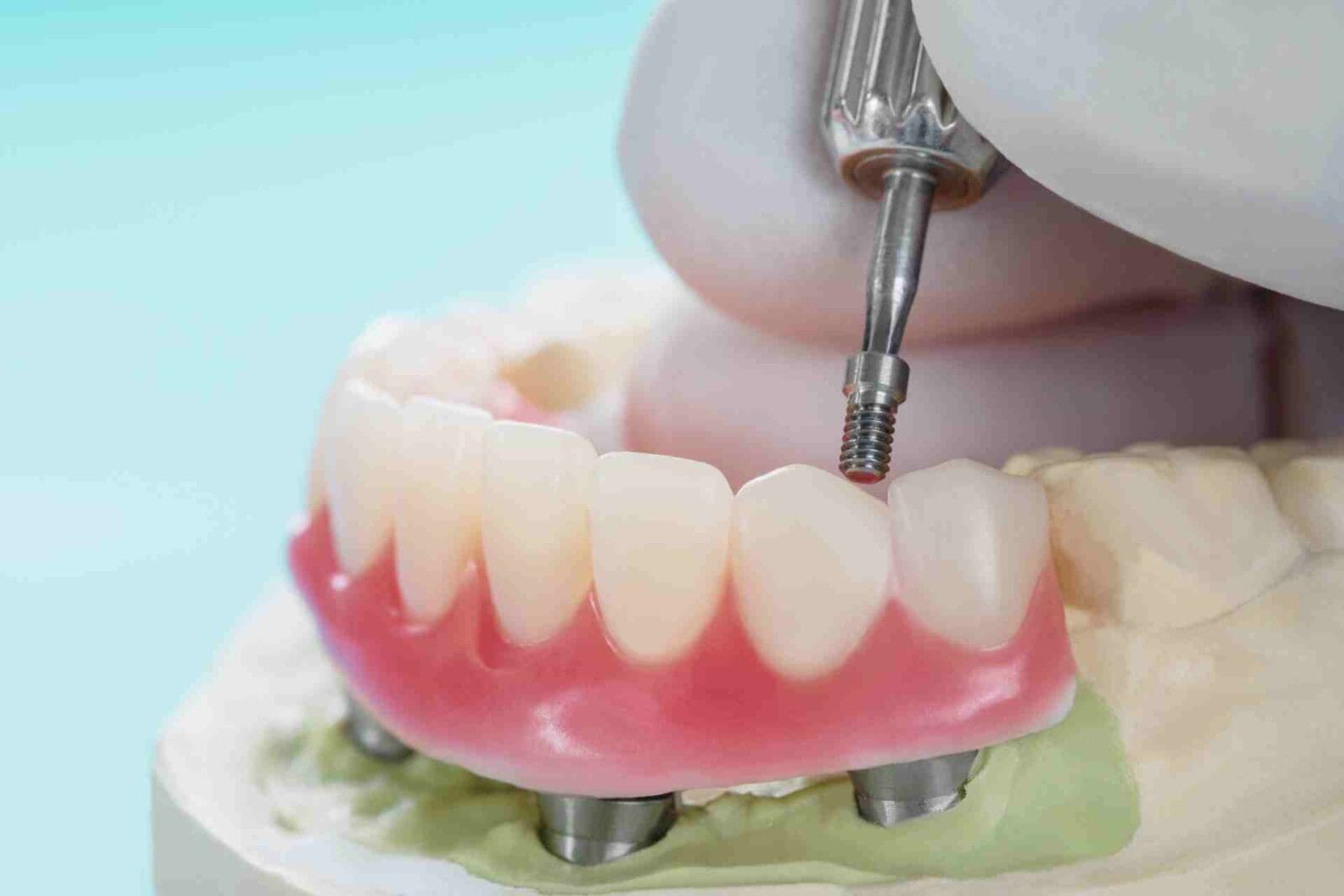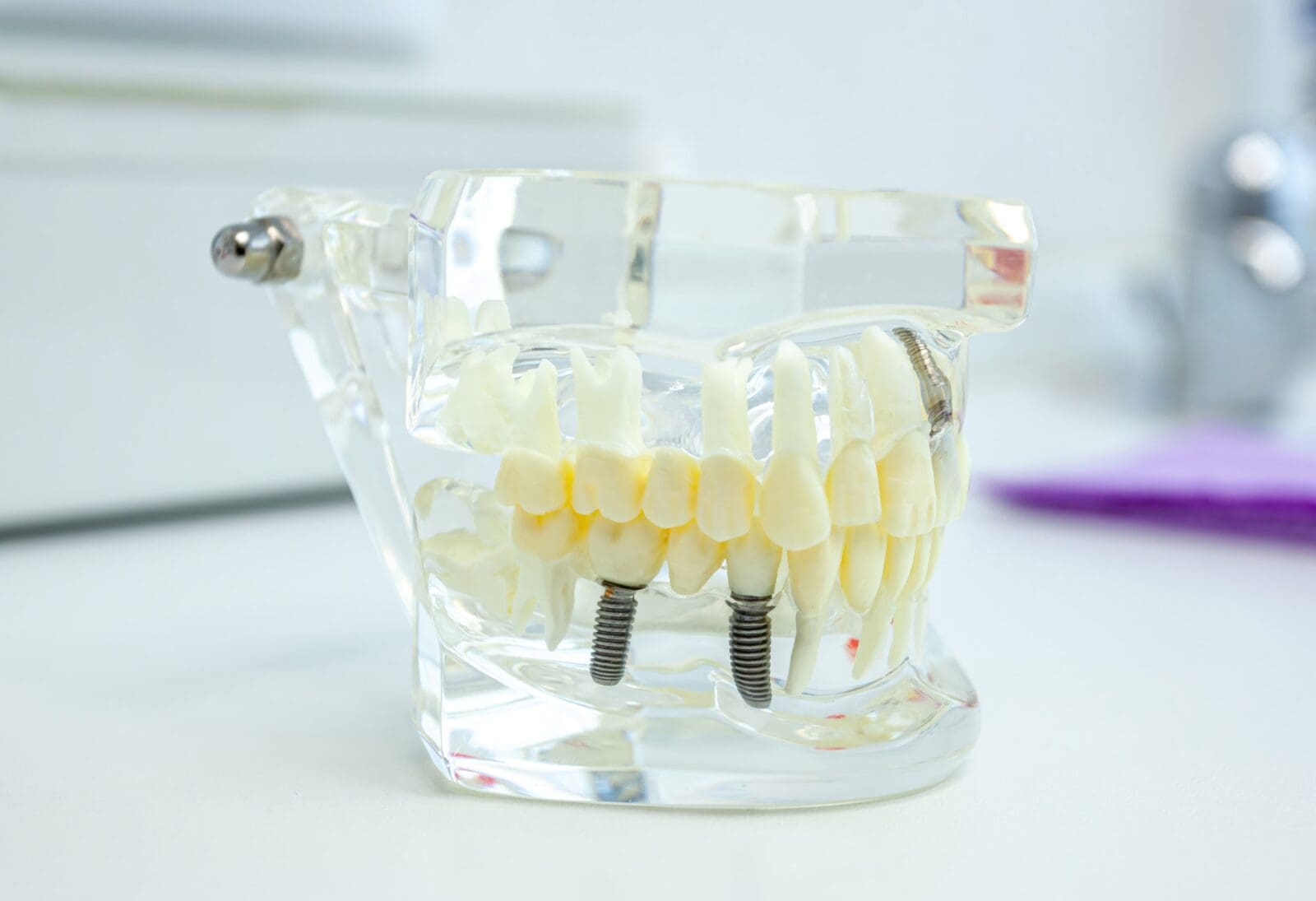A closer look at the original full-arch dental implant solution and how it changed modern tooth replacement.
At a Glance: Why All-on-4?
- Replaces all your upper or lower teeth with just four implants
- Supports a fixed, full-arch All-on-4 bridge
- Often avoids bone grafting by using angled back implants
- Teeth are typically placed the same day as surgery
- Designed for fast recovery and long-term success
- Proven protocol with decades of success
What Are All-on-4 Dental Implants?

All-on-4 is a game-changing dental implant technique that replaces all the teeth in your upper or lower jaw with just four implants. It’s a simple, effective solution for a full smile!
All-on-4 is a fixed, permanent solution for patients who have lost most or all of their teeth.
How It Works
Instead of placing a single implant for every missing tooth, All-on-4 uses:
- Two implants placed straight in the front of the jaw
- Two implants placed at an angle in the back for added support and bone contact
These four implants act as anchors for a custom full-arch restoration, often placed on the same day. This approach gives patients a full set of functional, natural-looking teeth with fewer implants and less surgery.
What Is the All-on-4 Bridge?
The All-on-4 bridge is a fixed, non-removable prosthesis that attaches to the four implants. It looks like a natural set of teeth and is designed to stay in place, no slipping, no adhesives, and no removal at night.
Bridges can be made from materials like acrylic or zirconia, depending on your needs, budget, and bite strength. They’re crafted to fit your mouth, support your facial structure, and restore full chewing power.
The Origin of All-on-4
All-on-4 was developed in the 1990s as a solution for edentulous patients (those without any teeth) who didn’t want dentures or extensive bone grafting. Its angled implant placement was a breakthrough, allowing stable support in areas with limited bone.
All-on-4 vs. Traditional Implants
Traditional implants usually require one implant per tooth or implant-supported bridges placed in segments. These often involve bone grafts, take longer, and cost more overall.
All-on-4 reduces the number of implants needed while still offering a secure, full-arch restoration. It also minimizes the need for grafting and shortens treatment time.
A Modern Alternative: All-on-X
While All-on-4 uses four implants, modern technology allows variation. The All-on-X method customizes the number and position of implants based on your unique anatomy, typically using 4 to 6 implants for improved support and flexibility.
How Is the All-on-4 Bridge Supported?
The All-on-4 system is designed for strength and stability, even in those patients with reduced bone volume. The placement of the implants is critical to the success of the procedure.
Strategic Implant Placement
Support for the All-on-4 bridge comes from four implants:
- Two implants placed vertically in the front part of the jaw where bone is typically stronger
- Two implants placed at an angle toward the back to avoid thin bone and reduce the need for grafting
This configuration allows the implants to evenly distribute pressure and securely anchor a full set of teeth, even in cases with bone loss.
Teeth in One Day
One of the biggest advantages of All-on-4 is the ability to place a temporary bridge the same day as surgery. This is called the immediate load protocol. It means you don’t have to go without teeth while your implants heal.
You’ll leave with a fixed, functional bridge that stays in place while your implants integrate with your jawbone.
Why the Bridge Stays Secure
Unlike removable dentures, the All-on-4 bridge is fixed directly to the implants. It does not come out and doesn’t rely on adhesives or suction. That means:
- No slipping or shifting when you eat or speak
- No need to remove the bridge at night
- Greater comfort and confidence in daily life
Common Bridge Materials
All-on-4 bridges are typically made from:
- Acrylic: Lightweight and cost-effective, often used for temporary bridges
- Zirconia: Stronger, more durable, and highly aesthetic, ideal for final restorations
Your dentist will recommend the best option based on your needs, bite force, and cosmetic goals.
Who Is a Good Candidate for All-on-4?

All-on-4 dental implants are designed for adults who have lost most or all of their teeth in one arch and want a permanent, fixed solution. It’s especially helpful for patients who wish to avoid removable dentures or extensive surgery.
You may be a candidate if you:
- Are missing all or most of your upper or lower teeth
- Have loose or failing teeth that need to be removed
- Wear dentures and are unhappy with how they fit or feel
- Have moderate bone loss and want to avoid bone grafting
- Are in good general health and able to undergo oral surgery
This treatment works well for both younger and older adults. Many people who were told they didn’t have enough bone for implants are now able to receive All-on-4 because of its angled implant approach.
However, if you’ve lost significant bone in the upper jaw, zygomatic implants may be a better option. We’ll assess your needs using 3D imaging and help you decide what’s best for your health and goals.
What’s the Difference Between All-on-4 and All-on-X?
All-on-4 and All-on-X are both full-arch dental implant solutions that use a small number of implants to replace an entire set of upper or lower teeth. The key difference is in the flexibility of the treatment plan.
All-on-4
- Always uses exactly four implants
- Follows a standardized placement protocol
- Originally designed to reduce bone grafting
- Proven track record with consistent results
- Typically best for patients with predictable anatomy
All-on-X
- Uses four to six implants, depending on your unique bone structure
- Allows more flexibility in placement and support
- Tailored to the patient’s anatomy using digital planning
- Offers added stability in more complex or compromised cases
- Often chosen for patients with advanced bone loss or custom needs
Both methods deliver a fixed, full-arch restoration. All-on-X is often considered an evolution of All-on-4 because it adapts the number of implants to your individual needs.
| Feature | All-on-4 | All-on-X |
| Number of Implants | Fixed at 4 | 4 to 6, based on case needs |
| Flexibility | Less adaptable to jaw conditions | Customizable placement |
| Bone Grafting | Often avoided | Also often avoided, more adaptable |
| Protocol | Standardized | Personalized with advanced imaging |
Recovery and Longevity
Healing after All-on-4 surgery is usually quicker than many expect. Most patients are up and moving the next day.
- Light activity can typically resume in 1 to 2 days
- A temporary bridge is worn for 3 to 6 months while the implants heal
- Your final bridge is designed for long-term strength, comfort, and aesthetics
- With proper care, implants can last 20 years or more, often for life
Good hygiene, regular checkups, and avoiding harmful habits (like smoking or grinding) help protect your investment for the long haul.
Caring for an All-on-4 Bridge

Taking care of your All-on-4 bridge is simple, but consistency is key. Just like natural teeth, these implants need daily cleaning and regular checkups to stay healthy long term.
Daily Hygiene Tips
- Brush gently twice a day with a soft-bristled toothbrush
- Use a water flosser or special implant floss to clean beneath the bridge
- Rinse with antimicrobial mouthwash if recommended
Professional Maintenance
- Schedule dental cleanings every 3 to 6 months
- We’ll check the health of your gums, the fit of your bridge, and the integrity of the implants
Healthy gums are crucial to the success of dental implants. We monitor closely for any early signs of issues and offer advanced gum disease treatment if needed.
Key Takeaways
- All-on-4 replaces an entire arch of teeth with just four implants
- The All-on-4 bridge is fixed in place and feels like real teeth
- Designed to avoid grafting and allow same-day smile delivery
- It’s a time-tested solution with long-term success
- A great option for many, but not the only one
Frequently Asked Questions
What is an All-on-4 bridge?
An All-on-4 bridge is a fixed, full-arch prosthetic that attaches to four dental implants. It replaces all the teeth in your upper or lower jaw and stays securely in place (no adhesives or removal needed).
How long does the All-on-4 procedure take?
The surgical procedure usually takes about two to three hours per arch. Most patients receive a temporary bridge the same day, with a final bridge placed after healing.
Is All-on-4 better than dentures?
Yes, for many people. All-on-4 is fixed in place, doesn’t move, and restores better chewing power. It also helps preserve your jawbone, unlike traditional dentures, which can lead to bone loss over time.
How do I clean an All-on-4 bridge?
Brush twice daily with a soft toothbrush and use a water flosser or floss threader to clean underneath the bridge. Regular dental cleanings are also important to maintain gum and implant health.
What is the success rate of All-on-4 dental implants?
All-on-4 implants have a success rate of 97-98% when placed by experienced specialists and properly maintained.
Book Your Consultation
Wondering if All-on-4 is the right solution for you?
Call us at 240-363-0360 or schedule your consultation online.
We’ll help you find the most comfortable, long-lasting way to restore your smile.
